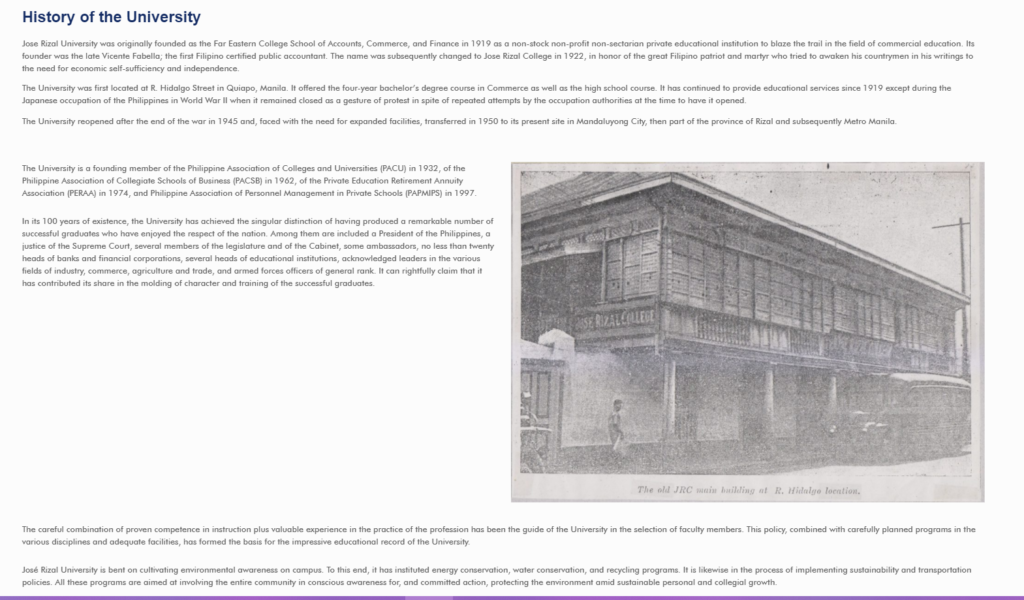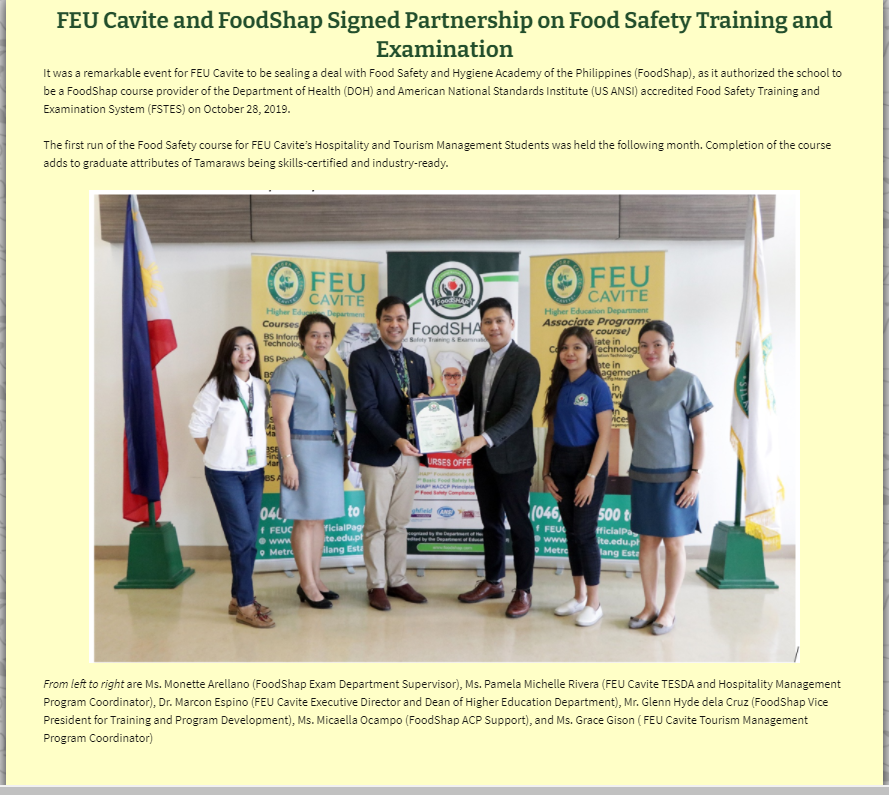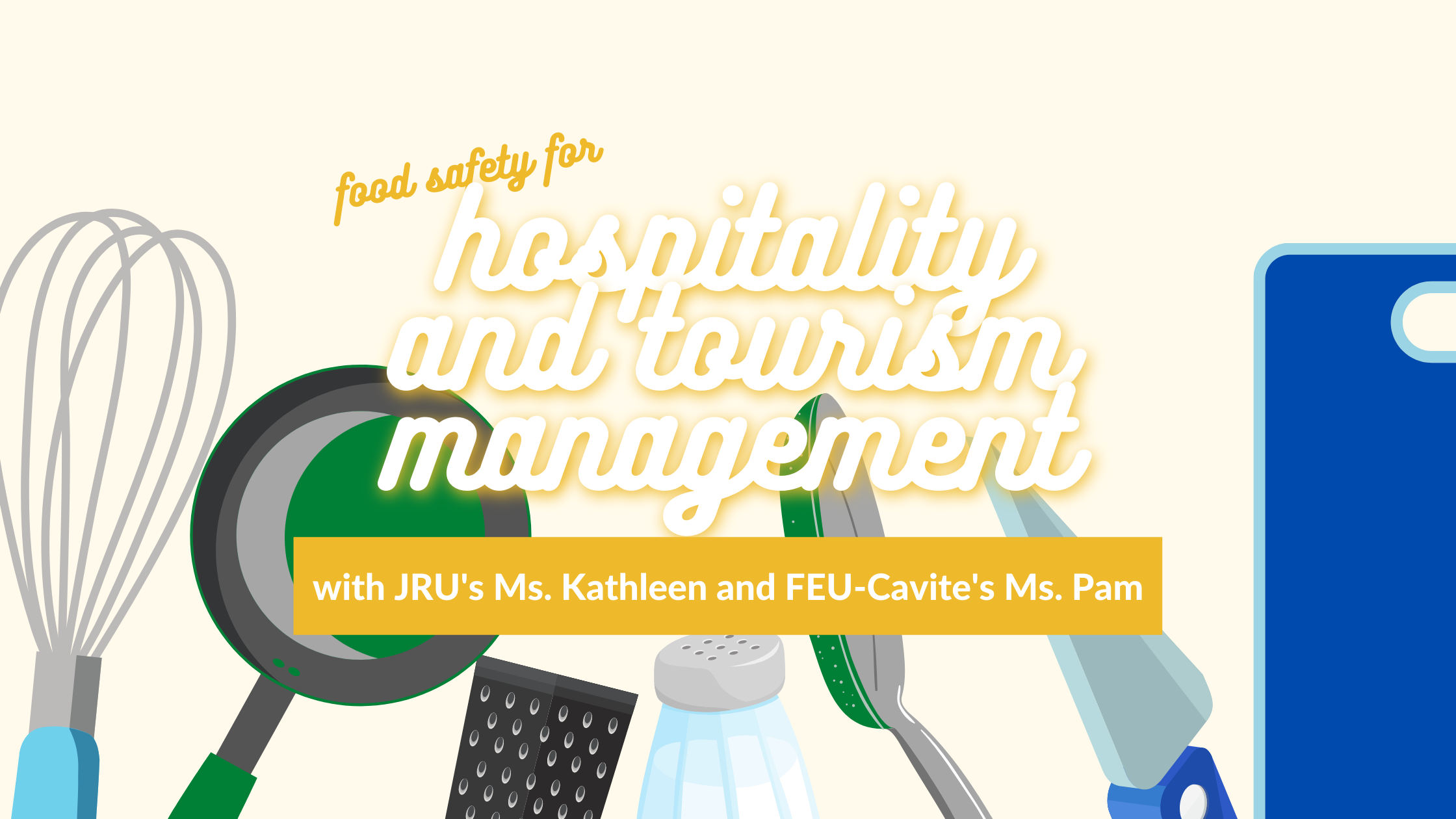Food Safety Certificate Program in Hospitality and Tourism Management
Hospitality and Tourism is one of the fastest-growing industries worldwide. It is no doubt that this service-driven industry aids in the improvement of hospitality and tourism in the country.
As future practitioners in their fields, these students hone their skills in catering, hotel, restaurant, tourism, and food and beverage management throughout their stay in their university. Courses are taken to achieve the result of becoming a qualified worker in the field of hospitality and tourism. Aside from skills, there is also a very vital factor in the said field: FOOD SAFETY.
It is essential that food safety is taught to students. As the nature of their career is to cater to the needs of other people, it is fitting that the safety of the people is their main concern.

With the help of Jose Rizal University Hospitality and Tourism Management Dean Ms. Kathleen Apilado and Far Eastern University – Silang Hospitality Management/ TESDA Program Coordinator, Pamela Michelle V. Rivera, MSBA-HRM, FSCO, let us get familiarized with the benefits of Food Safety Certificate Program according to their own experiences.
- How is Food Safety given importance in the curriculum of Hospitality and Tourism Management?
Ms. Kathleen: Based on CHED Memorandum Order No. 62 s 2017, there is a core subject for both tourism and hospitality management program that covers the safety and security, for HM program (Hospitality Management) there are several kitchen/laboratory subjects that applies the food safety practices. It is essential for the hospitality and tourism management curriculum to cover food safety because the students will practice being a food handler, and all that covers the food safety measures.

Ms. Pam: In our 2019 Curriculum for Hospitality and Tourism Management, we made sure that Food Safety was given importance. First, we included the Basic Food Safety for Food Handler Certification and examination system in our first year first semester offering for students to have a thorough understanding of what is food safety and its importance. We made sure that all our students are knowledgeable in all areas of food safety as early as their first-year level before they proceed to the actual food preparation in the higher level. Aside from this, we also made sure that the faculty teaching our students is a Basic Food Safety for Food Handler passer or higher, to ensure that what we share or what we teach to our students are relevant to encourage also our students to take Food Safety Certification seriously.

- What are the benefits of Food Safety Certificate Program for Hospitality and Tourism Management Students?
Ms. Kathleen: A food safety certification is very important not only for the food handlers and professionals, this will be an advantage for the students to acquire such certification in order for them to be employed in the food service industry globally.
Ms. Pam: There are lots of benefits of Food safety Certification Program for Hospitality and Tourism Management students such as:
It increases awareness on how to prepare food in a safe and healthy way.
Students will develop a food safety culture among their selves.
Students are qualified to become a professional culinarian once they graduate.
- Are there any significant changes you observed in students after having Food Safety Certificate Program?
Ms. Kathleen: Those with food safety certification are more aware of the safety measures and able to share to others their knowledge especially when handling food during their laboratory activities, many of them are being employed right away in any of the food service establishments.

Ms. Pam: The Food Safety Certification Program had contributed evident changes to our students, they became confident and competent in everything they do especially in the food preparation and presentation that what they are doing is right especially when it comes with the food safety. They also became more aware that their responsibility is not only to prepare good quality dishes but to make this food safe to consumers, and the last observation is our students practice and apply what they learned.
- What do you think is the effect for students after having Food Safety Certificate Program?
Ms. Kathleen: There are positive effect on the part of the students who are food safety certificate holders; knowledge – on the part of the measures and information the students understands, they tend to share this information to others that also helps everyone in the organization; employability – students gets the advantage of having the certification and being employed immediately; entrepreneurial traits – being able to apply the knowledge when a student puts up his/her own food business and advantage to market their businesses with food safety measures applied.
Ms. Pam: Food Safety Certificate program helped our students to gain additional knowledge and give them a thorough understanding of Food Safety and after passing the certification and examination system for Basic Food Safety for Food handlers, boosts their desire to finish their course and become a professional culinarian that display a professional image, positive attitude, and strong work ethics and apply and practice the food safety a real – work environment.
- What is your message/advice to every hospitality and tourism student?
Ms. Kathleen: Food safety is like “mathematics” for the tourism and hospitality program, it is essential in our curriculum to cover this program, for tourism industry there are culinary tourism (that can also covers food safety), hospitality industry that tackles, basic kitchen subjects, baking, Asian and western cuisine, gastronomy and so on.. As a food service practitioner as well, a certification is a requirement before you can actually work in a formal setting in the industry. It is important that each teacher must share their knowledge on the basic of food safety and for the part of students, a thorough knowledge that can be used during their internship and formal work setting can also be covered when taking a food safety certification.
Ms. Pam: For every hospitality and tourism student, always remember that our main responsibility is to deliver quality services and to prepare food that is safe to our family, friends and customer ,and we can only do this if we will inculcate among ourselves the importance of food safety, start developing a food safety practices in your home so that you can bring it in a real work.

6. What is your advice to other program head/ dean with regards to prioritizing Food Safety Certificate Programs for their Hospitality and Tourism Management students?
Ms. Kathleen: At this point, it is a must for every students in the tourism and hospitality management program and offer food safety certificate programs, this will be an advantage for our students to be working in the food service industry being globally competitive with skills and knowledge on food safety measures.
Ms. Pam: I know that all of us in the academe wants our students to be service- oriented, professionally skilled and responsible in performing and providing a full guest services for hotel and restaurant operations, and for us to help them by providing them further training and studies for them to develop their existing skills and acquired higher level of competencies in the hospitality industry and Food Safety Certification Program is one of this.
One of the core courses for Tourism and Hospitality Management is the Risk Management as Applied to Safety, Security and Sanitation, according to Commission on Higher Education (CHED). The course highlights the basic principles of personal hygiene, food safety and sanitation as applied in tourism and hospitality industry– more specifically: compliance with workplace hygiene procedures, establishment and maintenance of a safe and secure workplace, implementation of occupational health and safety procedures and performing basic First Aid procedures.
Source: https://ched.gov.ph/wp-content/uploads/2018/03/CMO-62-BS-Hospitality-Tourism-Management.pdf
According to Mr. Glenn Hyde Dela Cruz, FSCO, MFSM (Vice President for Program Development of Food Safety and Hygiene Academy of the Philippines, Food Safety Training and Examination System (FSTES) is recommended to be taken to help students achieve the required knowledge and skills for them to be industry-ready. Internationally accredited and locally recognized Food Safety Certificate programs are channeled through authorized course providers.
He also added that the programs include discussion on the roles and responsibilities of food handlers in Food Safety and Sanitation, basics of food safety hazards and risk management, personal and workplace hygiene, and occupational health and safety procedures inside the kitchen which are crucial knowledge needed for Hotel, Restaurant, Catering/Café (HoReCa) industry.

September 4, 2020 @ 5:05 am
I抎 have to test with you here. Which is not something I normally do! I enjoy reading a post that may make people think. Also, thanks for permitting me to comment!
January 15, 2021 @ 7:19 am
Write more, thats all I have to say. Literally, it seems as though you relied on the video to make your point. You definitely know what youre talking about, why throw away your intelligence on just posting videos to your site when you could be giving us something informative to read?